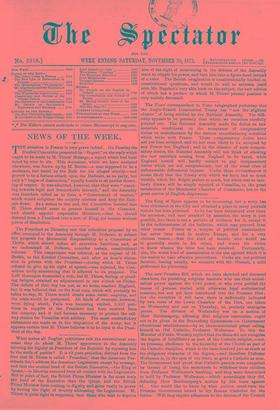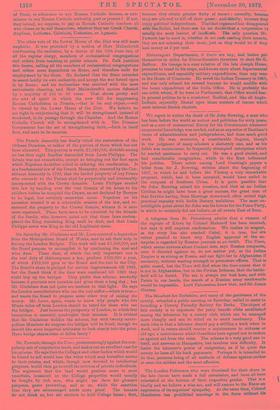The new Prussian Bill, which we have sketched and discussed
elsewhere, for punishing religious teachers who use their ecclesi- astical power against the Civil power, or who even publish the names of persons visited with otherwise legal ecclesiastical censures, has not yet been introduced into the Prussian Diet ; but the reception it will have there is sufficiently indicated by two votes of the Lower Chamber of the Diet, one taken on Wednesday and one on Thursday, on precisely analogous points. The division of Wednesday was on a motion of Herr Reichensperg, affirming that religious instruction ought not to be given in the Braunsberg Gymnasium—a Government educational establishment—by an excommunicated priest calling himself an Old Catholic, Professor Wollmann. To this the Minister of Public Worship replied that the State did not recognise the dogma of Infallibility as part of the Catholic religion,—nor, we presume, obedience to the hierarchy of the Church as part of the Catholic discipline, which is the issue involved just as much as the obligatory character of the dogma,—and therefore Professor Wollmann is, in the eyes of the State, as good a Catholic as ever. The Government had proof that Catholic parents were compelled by threats of losing the sacraments to withdraw their children from Professor Wollmann's teaching, and they were determined to bold by Professor Wollmann,—which accordingly they did, defeating Herr Reichensperg's motion by 264 votes against 81. One would like to know by what positive creed-tests the Prussian Government intend to try Roman Catholics for the future. Will they require adherence to the decrees of the Council
of Trent, or adherence to any Roman Catholic decrees, or sub- mission to any Roman Catholic authority, past or present ? If not, they intend, we suppose, to pay as Remain Catholic teachers all who choose so to call themselves, whether they-are Greek Church, Anglican, Lutheran, Calvinist, Unitarianror Agnostic.



































